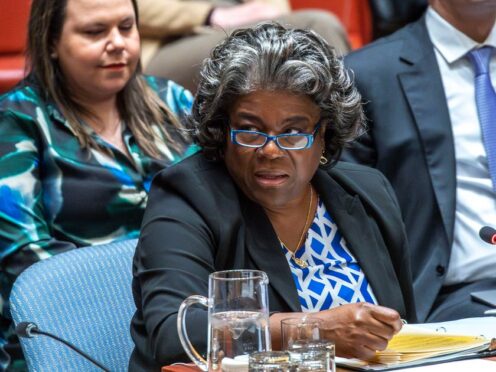The United States and Japan are sponsoring a UN Security Council resolution calling on all nations not to deploy or develop nuclear weapons in space, the US ambassador has announced.
Linda Thomas-Greenfield told a UN Security Council meeting on Monday that “any placement of nuclear weapons into orbit around the Earth would be unprecedented, dangerous, and unacceptable”.
The announcement that the US and Japan had circulated a resolution follows White House confirmation last month that Russia has obtained a “troubling” anti-satellite weapon capability, although such a weapon is not operational yet.
Russian President Vladimir Putin declared later that Moscow has no intention of deploying nuclear weapons in space, claiming that the country has only developed space capabilities similar to those of the US.
The Outer Space Treaty ratified by about 114 countries including the United States and Russia prohibits the deployment of “nuclear weapons or any other kinds of weapons of mass destruction” in orbit or the stationing of “weapons in outer space in any other manner”.
Japan’s foreign minister Yoko Kamikawa, who chaired the council meeting, said that even during “the confrontational environment” of the Cold War, the rivals agreed to ensure that outer space remained peaceful.
That prohibition on putting any weapons of mass destruction into orbit must be upheld today, she said.
Ms Thomas-Greenfield said all parties to the treaty must commit to the ban on nuclear and other destructive weapons, “and we must urge all member states who are not yet party to it to accede to it without delay”.
She said the United States looks forward to engaging with the other members of the 15-nation Security Council “to forge consensus around this text”.
Russia’s deputy UN ambassador Dmitry Polyansky said Moscow’s initial impression is that the proposed resolution is “yet another propaganda stunt by Washington”, “very politicised” and “divorced from reality”.
He criticised the text, saying the wording was not worked out by experts nor discussed at specialised international platforms such as the UN Conference on Disarmament or the UN Committee on Outer Space.
Outside the Security Council, Ms Thomas-Greenfield said the US is interested in engaging with parties to the treaty “to explore ways to increase confidence in compliance” with the ban on nuclear weapons and other weapons of mass destruction in outer space.
“The United States has already begun considering approaches to help ensure that countries cannot deploy nuclear weapons in orbit undetected, and we intend to engage with other states parties as our ideas evolve,” she said.
Ms Thomas-Greenfield also reiterated to the council the United States is willing to engage Russia and China right now, without preconditions, on bilateral arms control issues.
But Russia’s Mr Polyansky accused the West of “trying to inflict strategic defeat on my country”.
He said: “Any interaction will only be possible if the United States and Nato review their anti- Russian course, and when they show that they are ready to participate in comprehensive dialogue, taking into account all of those strategic stability factors and removing all of the concerns that we have about our security.”
UN Secretary General Antonio Guterres briefed the council, saying “geopolitical tensions and mistrust have escalated the risk of nuclear warfare to its highest point in decades”.
He said the movie Oppenheimer about Robert Oppenheimer, who directed the US project during the Second World War that developed the atomic bomb, “brought the harsh reality of nuclear doomsday to vivid life for millions around the world”.
“Humanity cannot survive a sequel to Oppenheimer,” the UN chief said.
